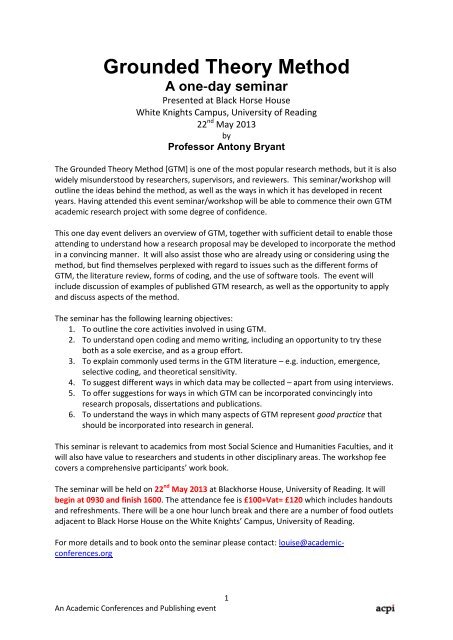Grounded Theory Method - Academic Publishing International API
Grounded Theory Method - Academic Publishing International API
Grounded Theory Method - Academic Publishing International API
You also want an ePaper? Increase the reach of your titles
YUMPU automatically turns print PDFs into web optimized ePapers that Google loves.
<strong>Grounded</strong> <strong>Theory</strong> <strong>Method</strong><br />
A one‐day seminar<br />
Presented at Black Horse House<br />
White Knights Campus, University of Reading<br />
22 nd May 2013<br />
by<br />
Professor Antony Bryant<br />
The <strong>Grounded</strong> <strong>Theory</strong> <strong>Method</strong> [GTM] is one of the most popular research methods, but it is also<br />
widely misunderstood by researchers, supervisors, and reviewers. This seminar/workshop will<br />
outline the ideas behind the method, as well as the ways in which it has developed in recent<br />
years. Having attended this event seminar/workshop will be able to commence their own GTM<br />
academic research project with some degree of confidence.<br />
This one day event delivers an overview of GTM, together with sufficient detail to enable those<br />
attending to understand how a research proposal may be developed to incorporate the method<br />
in a convincing manner. It will also assist those who are already using or considering using the<br />
method, but find themselves perplexed with regard to issues such as the different forms of<br />
GTM, the literature review, forms of coding, and the use of software tools. The event will<br />
include discussion of examples of published GTM research, as well as the opportunity to apply<br />
and discuss aspects of the method.<br />
The seminar has the following learning objectives:<br />
1. To outline the core activities involved in using GTM.<br />
2. To understand open coding and memo writing, including an opportunity to try these<br />
both as a sole exercise, and as a group effort.<br />
3. To explain commonly used terms in the GTM literature – e.g. induction, emergence,<br />
selective coding, and theoretical sensitivity.<br />
4. To suggest different ways in which data may be collected – apart from using interviews.<br />
5. To offer suggestions for ways in which GTM can be incorporated convincingly into<br />
research proposals, dissertations and publications.<br />
6. To understand the ways in which many aspects of GTM represent good practice that<br />
should be incorporated into research in general.<br />
This seminar is relevant to academics from most Social Science and Humanities Faculties, and it<br />
will also have value to researchers and students in other disciplinary areas. The workshop fee<br />
covers a comprehensive participants’ work book.<br />
The seminar will be held on 22 nd May 2013 at Blackhorse House, University of Reading. It will<br />
begin at 0930 and finish 1600. The attendance fee is £100+Vat= £120 which includes handouts<br />
and refreshments. There will be a one hour lunch break and there are a number of food outlets<br />
adjacent to Black Horse House on the White Knights’ Campus, University of Reading.<br />
For more details and to book onto the seminar please contact: louise@academicconferences.org<br />
An <strong>Academic</strong> Conferences and <strong>Publishing</strong> event<br />
1
Seminar outline<br />
The key innovations embodied in GTM<br />
Research that starts without a set of hypotheses<br />
or highly structured Research Question<br />
The basis of scientific discovery<br />
The Constant Comparative <strong>Method</strong><br />
Iteration between data gathering and analysis<br />
Open Coding<br />
From Codes to Categories and Concepts<br />
Approaches to coding<br />
‘All is Data’ – not just interviews and transcripts<br />
Purposive and Theoretical Sampling<br />
Memo writing<br />
All about Gerunds<br />
Divergences in the method<br />
‘Original’ GTM; ‘Orthodox’ GTM; Glaserian,<br />
Straussian, Constructivist GTM ...<br />
How much do you need to know about these?<br />
The ‘<strong>Theory</strong>’ in <strong>Grounded</strong> <strong>Theory</strong><br />
Experiences of GTM PhD researchers<br />
Mixing methods<br />
Induction, Deduction, Abduction<br />
How to start, what to do next, when to<br />
stop<br />
Initial questions for GTM research<br />
Sampling<br />
Saturation<br />
Open Coding & Memo Writing Exercise &<br />
Discussion<br />
An <strong>Academic</strong> Conferences and <strong>Publishing</strong> event<br />
2<br />
Solo efforts<br />
Group discussion<br />
Overcoming Misunderstandings and<br />
Suspicions<br />
The Literature Review<br />
‘An open mind not an empty head’<br />
Hypotheses as the outcome of a research<br />
project<br />
‘Emergence’<br />
Trustworthiness and credibility<br />
Dissemination and Publication<br />
Writing up – using memos<br />
Use of verbatim quotes<br />
Where is the ‘theory’?<br />
A guide to the GTM literature<br />
What to read and when to read it<br />
Glaser & Strauss; Glaser; Strauss & Corbin;<br />
Charmaz; and others<br />
Symbolic Interactionism, Reflexivity, Pragmatism<br />
Good Practices for All Researchers<br />
High level research questions<br />
Looking for processes<br />
Memo writing<br />
Abduction<br />
Seminar facilitator<br />
Antony Bryant is Professor of Informatics at Leeds Metropolitan<br />
University. He has written extensively on research methods, being a<br />
Senior Editor of The SAGE Handbook of <strong>Grounded</strong> <strong>Theory</strong>. He is<br />
known internationally for his work within the area of <strong>Grounded</strong><br />
<strong>Theory</strong> in particular and research methods in general. He regularly<br />
supervises and examines research degrees involving GTM. As well as<br />
his work at Leeds, he has developed and taught a wide range of postgraduate<br />
courses in The Netherlands, South Africa, Malaysia, and<br />
China. He is currently ASEM Professor at the University of Malaya,<br />
and Visiting Professor at the University of Amsterdam. His current research includes investigation of<br />
the ways in which the Open Source model might be used more widely, and in particular how it can<br />
be developed as a contributory feature for the re-constructed financial sector in the wake of the<br />
economic melt-down; coining the term Mutuality 2.0 and developing the concept in various<br />
contexts. He holds a BSc MSc and a PhD.
















